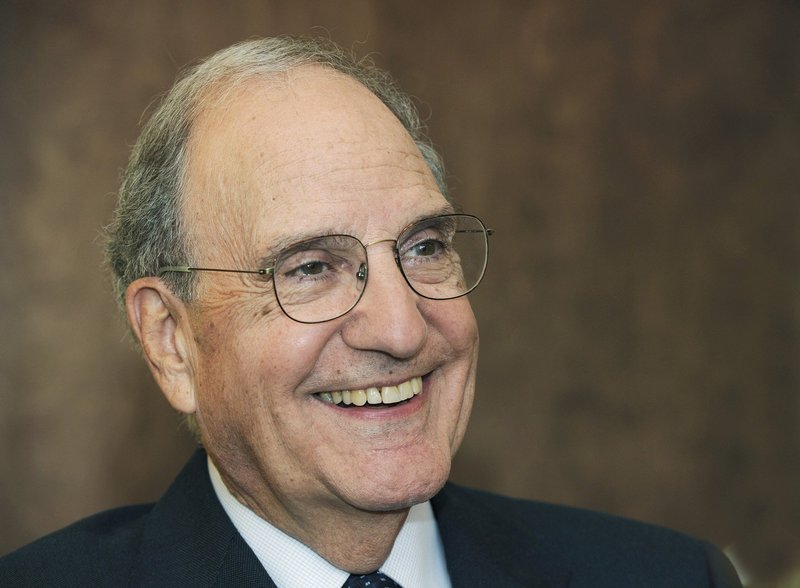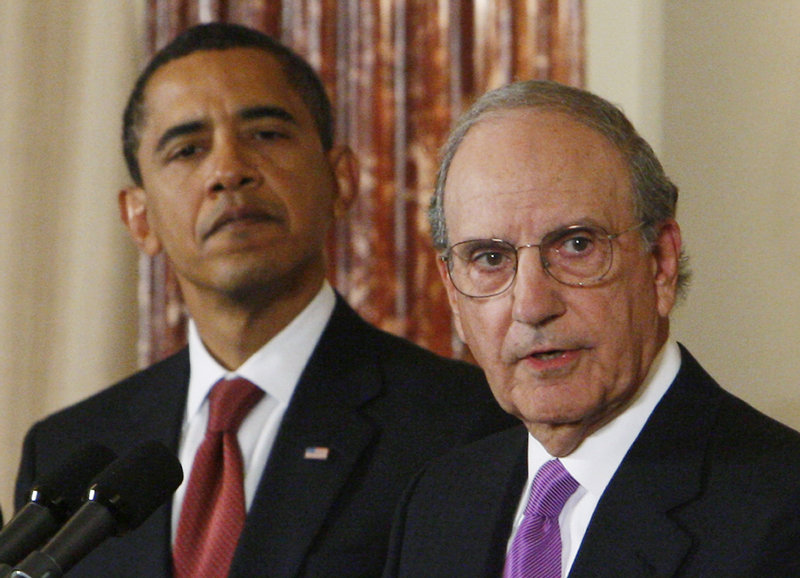Back in early 2009, when a newly elected President Obama and Secretary of State Hillary Clinton asked him to take on the mammoth task of forging a peace agreement in the Middle East, George Mitchell hesitated.
“I said, ‘I want to consult with some friends,’” said Mitchell, the former U.S. senator from Maine whose resume reads like a still-evolving history book. “And the first six people I called told me not to do it.”
So?
“So I stopped calling,” Mitchell said with a chuckle. Instead, he followed his own instincts and signed on for what he knew would be the most difficult job of his life.
A job, alas, that wasn’t supposed to end like this.
Back in those heady days of a new Obama administration, many around the world hoped out loud that the diplomatic miracle Mitchell achieved in Northern Ireland — a 1998 peace agreement between Catholics and Protestants that holds to this day — would be replicated with an end to decades of hostility between the Israelis and Palestinians.
Yet there Mitchell sat in the Oval Office on Friday, making good on a private letter he sent to the president five weeks ago: The two-year hitch Mitchell promised as special envoy to the Middle East is up and, disappointed as he may be at what remains a stalemate in the world’s most volatile hot spot, it’s time to move on.
“If a person could have succeeded through sheer will and hard work, George would have done it,” Obama told me in a telephone interview shortly after the two met. “I’m extremely grateful for his service. His country owes him a high debt.”
That we do.
Some in Washington say Mitchell, 77, never got a real chance to maximize his widely respected skills as a global mediator.
They say the White House’s micromanaging of the Israeli-Palestinian conflict deprived Mitchell of the maneuvering room he needed to achieve the mutual trust and extract the elusive concessions — curtailment of Israeli settlements in East Jerusalem and the West Bank, an end to rocket attacks and other violence by Hamas and other Palestinian militant groups — upon which any lasting peace must hinge.
Others point to the still-unfolding revolutions throughout the Arab world, along with this month’s freshly minted alliance between Hamas and the Palestinian Authority, as proof that Obama’s overall strategy for the Middle East is at best unfocused and at worst nonexistent.
But Mitchell, ever the statesman, had only praise for the president in a 30-minute telephone interview Friday afternoon from his soon-to-be-vacated Washington office.
“I like and admire and respect the president and I told him I appreciated the opportunity to again serve our country,” he said. “And I meant it sincerely.”
Mitchell also had a few words of advice for whomever picks up where he’s leaving off.
“You’ve got to have a lot of patience, a willingness to travel extensively, to endure a lot of arguing and hostility back and forth and not get unduly upset by it,” he said. “And obviously some knowledge and experience in the area.”
To be sure, Mitchell said, recent popular uprisings in Tunisia, Egypt, Yemen, Bahrain, Syria and Libya and elsewhere have left the Israelis and Palestinians unwilling to even talk about resuming talks until both sides can better discern where the political currents are headed.
“You cannot, and should not, view the Israeli-Palestinian conflict in isolation from the rest of the Middle East,” he said. “The instability that’s occurring in the region now has a direct and profound effect upon the parties and vice versa. There’s a synergy both ways.”
That message undoubtedly will be amplified this week when Obama hosts Israeli Prime Minister Benjamin Netanyahu and Jordan’s King Abdullah II in separate visits to the White House and delivers a major policy speech on the state of the Middle East on Thursday — the day before Mitchell’s official departure.
Awkward as the timing may appear, Mitchell said he takes at least some comfort in leaving the Middle East marginally better than he found it.
Israeli and Palestinian leaders did, after all, return to the negotiating table briefly last September before talks broke off late last year, largely over Israel’s refusal to extend a moratorium on new settlements. Even during that short period, Mitchell said, progress was made.
What’s more, Mitchell noted, “there has been no major outbreak of violence in the past two and a half years” in the Palestinian city of Gaza. And over the same period, “there has been a dramatic improvement in the situation in the West Bank.”
Finally, Mitchell noted, “our security relationship with Israel is stronger and more effective than it’s ever been.”
Meaning there’s still cause for optimism?
“I’m optimistic it will ultimately be achieved, but I’m not able to define any specific time period for it,” Mitchell replied. “My optimism is based not on my experience the past two years, but on my belief that a peace agreement, in which there are two states living side-by-side in peace and security, is so much in the interests of both sides that eventually there will be leaders and people who act on them.”
He sounded weary — and with good reason. While the recent unrest throughout the Middle East prevented him from traveling there in recent months, Mitchell spent much of the last two-plus years shuttling between Washington and various Arab countries.
“There was a period of time for several months (last year) where I went every other week,” he said. “I’d do one week there, one week here, one week there, one week here …”
The problem was, “here” mostly meant his office in Washington — not his home in Manhattan, where his wife, Heather, son Andrew, 13, and daughter Claire, 10, carried on without him. Then there were his adult daughter, Andrea, and his grandchild here in Maine, whom he saw even less frequently.
“It made it very difficult,” Mitchell said.
A case in point: Last week, Mitchell made a quick trip to Maine to accept an award from Junior Achievement. The next day, he flew to New York, where he was on the ground just long enough to watch his son play in a school baseball game. Then he got back on a plane and headed for Washington.
Andrew’s baseball game, Mitchell said wistfully, was “on the way.”
Add to that an almost complete absence last year from the family’s summer home in Seal Harbor — normally it’s a June-through-August hiatus — and it becomes clear why Mitchell wants his world, at least, to stop spinning so quickly.
Also known as retirement?
“No, no, no,” Mitchell said, laughing. “Look, I’ve got young kids! I’ve got to get them through college! I’ve got to keep working!”
Right. After a career that’s taken him from U.S. attorney to federal judge, from majority leader of the U.S. Senate to Northern Ireland peace envoy, from the chairmanship of Disney Corp. to founder of the Mitchell Institute, from lead investigator of steroid abuse allegations in Major League Baseball to partnership in a high-powered Washington law firm, few would bat an eye if Mitchell now chose to downshift from overdrive all the way to neutral.
“I don’t believe in that,” he said. “It’s healthier for people to stay active. So I’ll weigh my options now — but I certainly intend to work on a full-time basis.”
And spend more time, at long last, on the peaceful coast of his beloved Maine?
“Oh yes,” Mitchell said. “That’s one of the pluses.”
It is, after all, the way life should be.
Columnist Bill Nemitz can be contacted at 791-6323 or at:
bnemitz@mainetoday.com
Send questions/comments to the editors.




Success. Please wait for the page to reload. If the page does not reload within 5 seconds, please refresh the page.
Enter your email and password to access comments.
Hi, to comment on stories you must . This profile is in addition to your subscription and website login.
Already have a commenting profile? .
Invalid username/password.
Please check your email to confirm and complete your registration.
Only subscribers are eligible to post comments. Please subscribe or login first for digital access. Here’s why.
Use the form below to reset your password. When you've submitted your account email, we will send an email with a reset code.